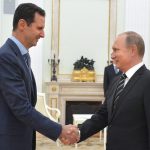RUSSIA MONITOR
Date: 23 April 2018
Libya: bad news for the Kremlin
Everything points to the fact that Russia lost a political strategist in Libya, on whom it counted for several years. True elimination of general Khalifa Haftar opens the gate for struggle for control over the most powerful military formation in Libya and may cause a new wave of destabilisation in the divided country. Among possible Haftar’s successors there are several high officers – but with none of them Russia had as good relations, as with Haftar.

Not long ago, General Khalifa Haftar was the most powerful man in the divided Libya being the head of the Libyan National Army (LNA) supporting, so called, eastern government in Tobruk competing with government in Tripoli. Several days ago he vanished from the public sphere which caused suspicions of his death. Finally, it turned out that Haftar was alive and was in a military hospital in Paris. But in contrary to official LNA information, 75-year-old Haftar is almost in a “vegetative state” and will never be able to function normally. Haftar has been suffering from cancer for long, but now his condition has worsened due to the metastasis in the brain. This has huge consequences for situation in Libya. Haftar never designated his deputy who now could take over the control. This has already caused chaos in LNA. The beginning of competition for Haftar’s legacy is marked by the assassination on the head of his staff. General Abdelrazak al-Nadhuri is one of candidates for the position of Commander-in-Chief, together with two Haftar’s sons and commander of LNA special forces. On April 19, he survived unscathed the bombing attack. But it is known that the United Arab Emirates, Egypt and tribes from eastern Libya will have a decisive vote in choosing the Haftar’s successor.
The end of Haftar’s career has a severe influence on Russian plans towards Libya. The Kremlin believed that the commander of LNA would become the most important figure in Libya after the final end of civil war. Russians cared for the best relations with Haftar. In October 2015 he already said to his officers that Russia promised to help in the fight with Islamists. In June 2016 in Moscow, Haftar met with Minister of Defence Sergey Shoygu and Secretary of the Security Council Nikolai Patrushev. In November 2016 he again flew to Russia where he had a conversation with Sergey Lavrov and meetings in Ministry of Defence. In January 2017, Haftar paid a visit on the board of Russian aircraft carrier Admiral Kuznetsov on its way back from Syria. Finally, in August 2017, Haftar again visited Moscow where he talked to the Minister of Foreign Affairs Sergey Lavrov and Minister of Defence Sergey Shoygu.
All texts published by the Warsaw Institute Foundation may be disseminated on the condition that their origin is credited. Images may not be used without permission.
















